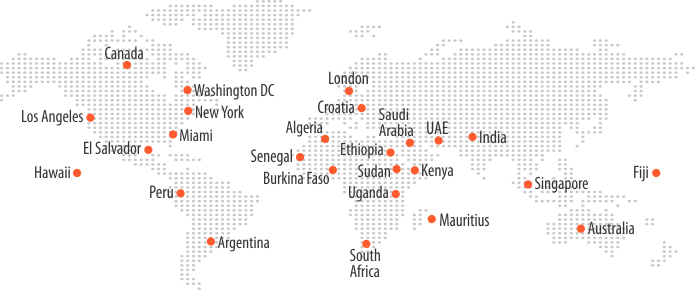Reshaping Middle Eastern Connectivity: The Role of Wholesale VoIP Termination

The Middle East is a lively tapestry of cultures, trade, and communication, nestled at the crossroads of age-old traditions and cutting-edge innovation. Here, where centuries-old customs harmonize with modern technology, the significance of communication transcends mere exchange of information—it is the lifeblood of society, the catalyst for progress, and the cornerstone of relationships. In this dynamic landscape, where every interaction is steeped in history and culture, Wholesale VoIP termination emerges as a transformative force, reshaping the very fabric of communication. The Middle East and Africa wholesale voice carrier market is expected to rise from US$ 1,979.67 million in 2021 to US$ 2,667.37 million in 2028 at a cumulative yearly growth rate (CAGR) of 4.4%.
Wholesale VoIP Providers provide a guiding light of connectivity for people and enterprises navigating the complexity of the Middle Eastern market. They do this by providing affordable solutions, seamless international reach, and unmatched quality of service. Join us on a journey through the intricate alleys of Middle Eastern communication dynamics, where tradition meets innovation, and explore the transformative power of Wholesale VoIP, which is revolutionizing how we connect, collaborate, and thrive in the digital age.
Understanding Middle Eastern Communication Landscape
The Middle East is a dynamic region where communication plays a pivotal role in social interactions, business transactions, and cultural exchanges. Understanding the communication landscape is essential for businesses seeking to establish a presence or expand operations in the region.
Communications Infrastructure
The Middle East boasts modern communications infrastructure, with major cities equipped with advanced telecommunications networks and high-speed internet connectivity. However, rural areas may still face challenges in accessing reliable communication services, presenting opportunities for infrastructure development and expansion.
Connectivity Trends
Mobile penetration rates in the Middle East are among the highest globally, with smartphones serving as primary devices for communication and internet access. The way people work communicate, and access information has changed dramatically as a result of the broad adoption of mobile technology. This has made it possible for companies to use mobile channels to connect with a diverse group of clients.
Telecom Industry Dynamics
The telecommunications industry in the Middle East is characterized by a mix of state-owned operators and private companies, each competing to provide innovative services and solutions. Regulatory frameworks vary across countries, impacting market dynamics and competition. Understanding the regulatory landscape is crucial for businesses navigating the telecom industry in the region.
Digital Transformation
The Middle East is undergoing a digital transformation, with governments and businesses embracing digital technologies to enhance communication, streamline operations, and drive innovation. Businesses now have the chance to better utilize cutting-edge technology like cloud computing, big data analytics, and artificial intelligence to increase the efficacy and efficiency of their communications.
Emerging Trends
Emerging trends in Middle Eastern communication include the rise of Over-the-Top (OTT) services, such as messaging apps and video conferencing platforms, which offer alternative communication channels to traditional telecom services. In addition, the Internet of Things (IoT) is becoming more and more well-known. It allows linked objects to exchange data and communicate with each other without any problems, completely changing sectors like logistics, transportation, and healthcare.
Advantages of Wholesale VoIP in the Middle East
Cost-effectiveness
Wholesale VoIP termination provides economic advantages over traditional telephony systems, reducing operational costs significantly. By leveraging existing internet infrastructure for voice communication, businesses can avoid hefty expenses associated with traditional phone lines, long-distance charges, and hardware maintenance. This cost-saving aspect is particularly appealing in the Middle East, where businesses are constantly seeking ways to optimize expenditures while maximizing efficiency.
Flexibility and Scalability
Enhanced flexibility and scalability cater to the dynamic business environments prevalent in the region, allowing organizations to adjust their communication infrastructure seamlessly according to changing demands. With Wholesale VoIP, you may instantly scale up or down based on business needs without requiring extra physical infrastructure, unlike traditional telecommunication systems. Due to their agility, businesses are able to react quickly to changes in the market, peaks, and valleys in the seasons, or chances for expansion, all while maintaining cost-effective communication services.
Quality of Service Improvements
Wholesale VoIP ensures superior quality of service, delivering clear and reliable voice communication experiences, thereby enhancing productivity and customer satisfaction. Through advanced codecs and packet prioritization techniques, Wholesale VoIP providers optimize voice data transmission over the internet, minimizing latency, jitter, and packet loss. As a result, businesses in the Middle East can enjoy crystal-clear voice calls, seamless conferencing, and multimedia collaboration, enhancing internal communication efficiency and customer interactions.
Global Reach
Wholesale VoIP transcends borders, facilitating global reach and connectivity with ease, thereby opening avenues for international trade, collaboration, and expansion into new markets. By leveraging the power of the internet, businesses in the Middle East can establish virtual offices, connect remote teams, and reach out to customers worldwide without geographical constraints.
This global reach enables businesses to explore new revenue streams, tap into diverse talent pools, and forge strategic partnerships with international counterparts, fostering innovation, growth, and competitiveness in the global marketplace.
Challenges and Obstacles: Navigating the Terrain
Regulatory Hurdles and Compliance Issues
Wholesale VoIP providers must navigate diverse legal frameworks across the region, ensuring meticulous adherence to regulatory requirements and compliance standards. With varying licensing procedures, taxation policies, and government regulations in different countries, compliance becomes a complex and time-consuming process.
In addition, the legal landscape may become even more complex due to political unpredictability and regulatory changes, necessitating ongoing risk assessment and preventative steps to minimize risks and guarantee company continuity.
Infrastructure Limitations
Infrastructure limitations, especially in remote or underdeveloped areas, pose obstacles to seamless connectivity, requiring investments in network infrastructure and technological advancements. While major cities in the Middle East boast modern telecommunications infrastructure and high-speed internet connectivity, rural areas and less developed regions may lack adequate infrastructure to support Wholesale VoIP services.
This digital divide not only hampers access to communication services but also limits economic opportunities and social development, necessitating targeted investments and public-private partnerships to bridge the gap and foster inclusive growth.
Security Concerns
To protect sensitive data and guarantee the integrity of communication networks, strong security procedures are essential. Security concerns about data privacy and network vulnerabilities highlight this. With the proliferation of cyber threats, including hacking, phishing, and malware attacks, Wholesale VoIP providers face constant cybersecurity risks that could compromise the confidentiality, availability, and integrity of voice data.
To address these concerns, businesses must implement multi-layered security measures, including encryption, authentication, intrusion detection, and regular security audits, to protect their communication infrastructure and safeguard against potential threats.
Strategies for Effective Integration: Embracing Innovation
Localization Efforts
Localization efforts bridge cultural divides, fostering resonance and acceptance among diverse audiences by adapting communication strategies and service offerings to align with local preferences and norms. By incorporating language localization, cultural sensitivity, and regional customization into their Wholesale VoIP solutions, businesses can enhance user experience, foster engagement, and build long-term relationships with customers in the Middle East.
Partnerships and Collaboration
Partnerships with local stakeholders amplify impact, leveraging insights and networks to navigate regulatory complexities and establish a foothold in the market, fostering mutually beneficial collaborations and alliances. By forging strategic partnerships with telecommunications regulators, industry associations, and local businesses, Wholesale VoIP providers can gain valuable market insights, access new customer segments, and navigate regulatory challenges more effectively, driving growth and market penetration in the Middle East.
Compliance and Regulatory Adherence
Compliance with regulatory requirements ensures legality and trust, bolstering credibility and reputation, while adherence to industry standards and best practices enhances the quality and reliability of Wholesale VoIP services. Businesses may reduce legal risks, gain the trust of clients, and show their dedication to moral business conduct in the Middle East by keeping up with regulatory developments, acquiring the required licenses and permissions, and putting strong compliance systems and controls in place.
Infrastructure and Technology Investments
By strengthening the base facilitating seamless Wholesale VoIP provision and guaranteeing dependability and scalability in the face of changing demands, infrastructure and technology upgrades stimulate innovation and technological advancement in the sector.
By investing in state-of-the-art data centers, network infrastructure, and software platforms, businesses can enhance service reliability, scalability, and performance, meeting the growing demand for Wholesale VoIP services in the Middle East and positioning themselves as market leaders in the digital era.
Bankai’s Wholesale VoIP Services: Forging the Future of Communication in the Middle East
Recapitulating the journey, it beckons businesses to embrace innovation and connectivity, leveraging the transformative power of Wholesale VoIP termination to unlock new opportunities and drive growth. As the curtain falls, a call to action resonates, inviting stakeholders to join hands in sculpting the future of communication in the region.
With Bankai Group as a trusted telecom partner, businesses confidently navigate this landscape, harnessing the power of connectivity to propel growth and prosperity and solidify their position as leaders in the digital era.






